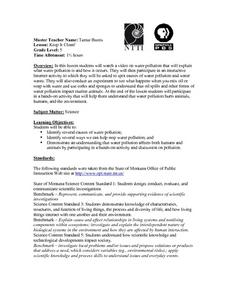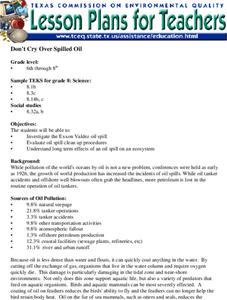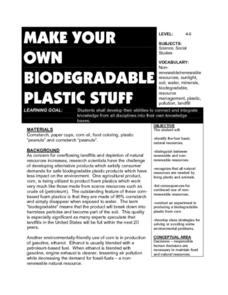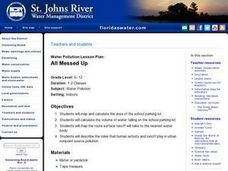Curated OER
Pollution - What is It Doing to Us?
Students recognize some forms of pollution. In this science lesson plan, students recognize and understand some of the devastating effects of the acid rains and other possible factors that are contrary to the pH balance of nature.
Curated OER
Keep It Clean!
Fifth graders investigate the how water becomes polluted and how it effects the environment, animals, and humans. They watch a video and conduct experiments.
Curated OER
Water Filtration Challenge
Learners create an all-natural water filtration system. In this instructional activity on natural water filtration, students build upon prior knowledge to build a filtration unit made of plants, soils, sand, pebbles and rocks that can...
Curated OER
Oceans and Coasts
Students explore the topic of marine pollution. They define key vocabulary words, list examples of marine pollution, complete a true/false handout, read an article, and participate in a class discussion.
Teach Engineering
Aerogels in Action
Model an oil spill cleanup. An engaging engineering lesson has groups using aerogels to simulate an oil spill cleanup (vegetable oil in water). Along the way, they learn about nanotechnology and hydrophilia/hydrophobia.
Curated OER
Exploring the Science of Oil
High schoolers analyze the basic techniques used to find and produce oil. They also create a small project that allows them experiment with solutions to maximize the amount of colorless liquid produced from colored solutions.
Curated OER
Don't Cry Over Spilled Oil
Students study the Exxon Valdez Oil Spill while evaluating oil spill clean up activities. They discover the long term impact can have on an ecosystem by completing this experiment.
Curated OER
Water Pollution Lesson Plan: Don't Trust Your Eyes
Learners develop a list of actions they could perform that would protect our water resources from pollution. They formulate hypotheses, conduct experiments and draw conclusions about actual pollutants found in our water supply.
Curated OER
Local Environmental Issues: Pollution
Third graders discuss the ways in which human interaction with the environment and production of waste products contribute to pollution. Through a pollution demonstration, they explain how various groups of plants and animals can be...
Curated OER
Air Pollution: Visible And Invisible
Fourth graders observe air pollution that is visible and invisible with experimentation. During the experiment the students collect data that needs analysis. The observations are recorded in the lab journal. The data also is represented...
Curated OER
Solar Energy Experiment
Students observe solar energy at work. In this science instructional activity, students watch two bottles, painted black and white, sit in the heat with balloons on the mouth of the bottles. They observe and discuss why the balloon of...
Curated OER
Phytoremediation
Students participate in a lab designed to facilitate the clean up and remove of substances ranging from heavy metals to dynamite. They focus on the remediation of copper. They discuss their results of this open ended inquiry experiment.
Curated OER
Digital Video Lesson Plan: Brine Shrimp
Students participate in classroom experiment to gain better understanding of type of environment brine shrimp can best survive. Students then explore effects of common saltwater pollutants on survival of animals in sea.
Curated OER
Make Your Own Biodegradable Plastic Stuff
Young scholars identify the four basic natural resources. They distinguish bettween renewable and non-renewable resources. Pupils recognize that all natural resources are needed by living plants and animals. Students list consequences...
NASA
Keeping Nine Eyes on the Weather
Take a look at climate change from another angle. Readers learn about the MISR instrument on the Terra satellite and how it studies Earth. Pupils experience how the multiple cameras give scientists multiple views so they can better study...
Curated OER
You are the Microbiologist
In this lesson, young scholars demonstrate comprehension of basic lab techniques by properly using these techniques in preparing a laboratory investigation, demonstrate synthesis of prior lab experiences by solving a new problem using...
Curated OER
Don't Trust Your Eyes
Students brainstorm a list of possible actions that they could do to protect the water resources from pollution. They create hypotheses and conclusions by completing experiments and observing different pollutants.
Curated OER
Oily Oceans
Students are read a book about oceans. They participate in an experiment discovering the effects of oil on water. They discuss different types of pollution and how they can be prevented.
Curated OER
What Are We?
Pupils describe different types of water pollutants. They complete experiments in which they observe the affects of water pollution on algae. They also brainstorm and list three causes of each water pollutant.
Curated OER
CO Buildup City
High schoolers conduct a controlled experiment. They collect data in an organized manner. Students analyze data to reach a conclusion and communicate findings. They explain how city size, temperature, and pollution is related to the air...
Curated OER
All Messed Up
Students begin the experiment by mapping and calculating their school parking lot. They calculate the volume of water falling on the lot and map the route the water runoff takes. They discuss the roles that humans play in affecting water...
Curated OER
Breaking News English: World Naked Bike Ride Against Oil Use
In this English worksheet, learners read "World Naked Bike Ride Against Oil Use," and then respond to 47 fill in the blank, 7 short answer, 20 matching, and 8 true or false questions about the selection.
Curated OER
Indoor Air Pollutant Sensing LAB: Peppermint Diffusion
Students engage in an experiment for the scientific concept of diffusion of particles. There are instructions for classroom set up prior to conduction of the activity. Students sit in the classroom that is filled with the smell of...
Curated OER
Environmental Concerns (1) Analysis of Lead in Paint (2) Analysis of Water
A scenario and background information are provided for two different open-ended experiments that experienced chemistry classes can perform toward the end of the school year. In the first, they design a method for testing flakes of paint...























